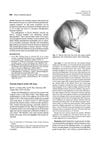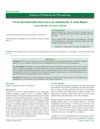 8 citations,
October 1989 in “Journal of the American Academy of Dermatology”
8 citations,
October 1989 in “Journal of the American Academy of Dermatology” A 5-year-old boy's seasonal hair loss is linked to his allergies.
 1 citations,
January 1987 in “Journal of The American Academy of Dermatology”
1 citations,
January 1987 in “Journal of The American Academy of Dermatology” The patient's hair loss was likely not caused by beta blockers but possibly by stress or other factors.
 41 citations,
October 2000 in “Dermatologic clinics”
41 citations,
October 2000 in “Dermatologic clinics” Better hair care products are needed to protect against grooming and chemical damage.
10 citations,
January 2018 in “International Journal of Trichology” Mesalazine may help treat extensive alopecia areata effectively.
 1 citations,
October 2018 in “InTech eBooks”
1 citations,
October 2018 in “InTech eBooks” Only minoxidil and finasteride are FDA-approved for hair loss, with other treatments available but less effective or with side effects.
 December 2019 in “Journal of pediatrics & neonatology”
December 2019 in “Journal of pediatrics & neonatology” A 13-year-old boy had a rare, stable type of hair loss with little chance of regrowth, but treatment is available for looks.
20 citations,
January 2003 in “Dermatology online journal” Prostaglandin analogs like Latanoprost might help grow hair on the scalp and body.
September 2024 in “Dermatology Online Journal” Facial hair growth from minoxidil stopped after she quit using it.

Combining epinephrine with a steroid may help regrow hair in severe alopecia areata cases.
 8 citations,
December 2013 in “Journal of Investigative Dermatology Symposium Proceedings”
8 citations,
December 2013 in “Journal of Investigative Dermatology Symposium Proceedings” Hepatitis C treatment may trigger complete hair loss, especially in those with a history of patchy hair loss, but hair usually grows back within a year.
 2 citations,
February 2016 in “British Journal of Dermatology”
2 citations,
February 2016 in “British Journal of Dermatology” Bimatoprost solution 0.03% is effective for treating sparse eyelashes.
 64 citations,
November 2008 in “Journal of The American Academy of Dermatology”
64 citations,
November 2008 in “Journal of The American Academy of Dermatology” A new type of rapid hair loss called ADTA usually gets better on its own within 6 months.
 63 citations,
May 2000 in “Australasian Journal of Dermatology”
63 citations,
May 2000 in “Australasian Journal of Dermatology” Chemotherapy and bone marrow transplant can cause permanent hair loss.
 January 2019 in “Clinical Dermatology Open Access Journal”
January 2019 in “Clinical Dermatology Open Access Journal” Combining corticosteroids and non-ablative fractional laser therapy may effectively treat extensive alopecia areata.
 January 2010 in “Yearbook of Dermatology and Dermatologic Surgery”
January 2010 in “Yearbook of Dermatology and Dermatologic Surgery” Topical latanoprost and bimatoprost ophthalmic solutions don't help eyelash growth in patients with alopecia areata.
 14 citations,
January 1985 in “International Journal of Dermatology”
14 citations,
January 1985 in “International Journal of Dermatology” The cause of alopecia areata was unknown, and while various treatments existed, no best treatment was agreed upon.
 72 citations,
July 2014 in “American journal of clinical dermatology”
72 citations,
July 2014 in “American journal of clinical dermatology” Some treatments, like corticosteroids and sensitizing agents, can help with alopecia areata, but more high-quality research is needed.
 4 citations,
January 2020 in “Skin appendage disorders”
4 citations,
January 2020 in “Skin appendage disorders” A woman with an unusual pattern of hair loss was confirmed to have Frontal Fibrosing Alopecia and treated with specific medications.
 18 citations,
November 2012 in “Australasian Journal of Dermatology”
18 citations,
November 2012 in “Australasian Journal of Dermatology” A 66-year-old man with a rare case of male frontal fibrosing alopecia did not regrow hair despite treatment.
 4 citations,
May 2019 in “Journal of The European Academy of Dermatology and Venereology”
4 citations,
May 2019 in “Journal of The European Academy of Dermatology and Venereology” Hair loss treatment caused more hair loss in a man.
 4 citations,
February 2022 in “JAAD case reports”
4 citations,
February 2022 in “JAAD case reports” The document concludes that low-dose oral minoxidil successfully regrew hair in a patient with permanent hair loss after chemotherapy and stem cell transplant.
11 citations,
July 2018 in “AJGP” Low-dose oral minoxidil effectively reduces hair loss in women with female pattern hair loss.
 9 citations,
February 2005 in “The Journal of Men's Health & Gender”
9 citations,
February 2005 in “The Journal of Men's Health & Gender” Finasteride effectively treats male hair loss, increasing length and thickness.
 3 citations,
June 2020 in “Cureus”
3 citations,
June 2020 in “Cureus” A woman's hair loss led to discovering she had lupus.
 2 citations,
July 2018 in “Elsevier eBooks”
2 citations,
July 2018 in “Elsevier eBooks” Trichoscopy is a useful tool for diagnosing and managing hair and scalp conditions, often better than traditional methods.
 2 citations,
August 2022 in “JAAD case reports”
2 citations,
August 2022 in “JAAD case reports” COVID-19 vaccines may rarely worsen hair loss in people with severe alopecia, but the benefits of vaccination still outweigh this risk.
 6 citations,
March 1999 in “Seminars in Cutaneous Medicine and Surgery”
6 citations,
March 1999 in “Seminars in Cutaneous Medicine and Surgery” Scalp biopsies are essential for accurately diagnosing alopecia areata.
17 citations,
December 2013 in “Journal of Investigative Dermatology Symposium Proceedings” Autoimmune and metabolic issues are linked, and treating one may worsen another.
 74 citations,
April 2005 in “Dermatologic Clinics”
74 citations,
April 2005 in “Dermatologic Clinics” Minoxidil and finasteride are effective for male hair loss, minoxidil for female hair loss, and various treatments like corticosteroids work for alopecia areata; treatment should be tailored to the individual.
 85 citations,
October 2012 in “Dermatologic Clinics”
85 citations,
October 2012 in “Dermatologic Clinics” Alopecia Areata is an autoimmune condition often starting before age 20, with varied treatment success and a need for personalized treatment plans.

























